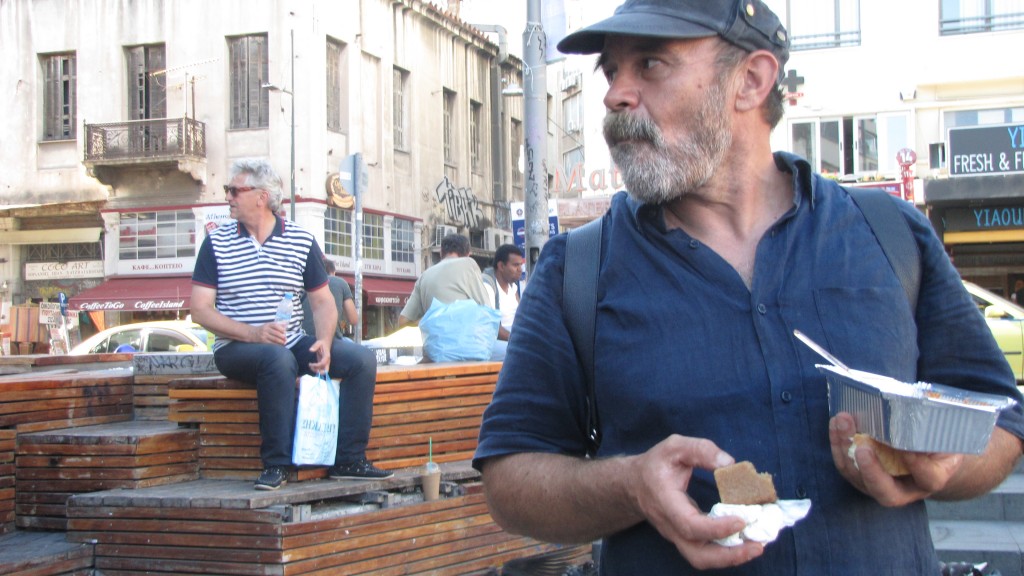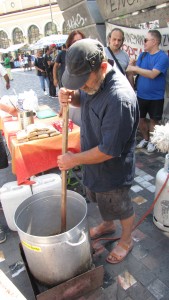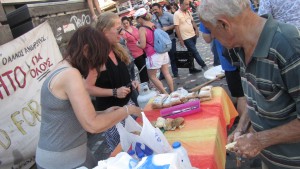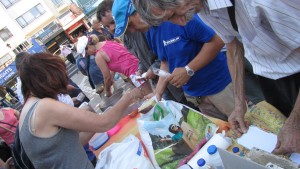The poverty epidemic in Greece
“They may have the money, but we have each other,” insists the cook who feeds Athens' poor. “This is not philanthropy, this is the natural human state.”

Konstantinos Polychronopolous, founder of Society Kitchen.
©Boštjan Videmšek
Monday 13 July 2015
Last Wednesday afternoon, the Monastiraki Square in Athens saw the formation of a long and silent line of people. In many ways, they were as varied a bunch as one could imagine, but they all had one thing in common: their tired faces, slowly blistering under the merciless summer sun, were etched with profound anxiety.
A cloud of demoralised silence enveloped the scene, the sort of silence one imagined would be almost impossible to interrupt. Yet this was exactly what happened as the spell was broken by a cry from one of the men waiting for free lunch.

“Hey, that smells delicious! This guy can really cook!”
For most of the people forming the queue, it was their only meal for the day. The entire square smelled of coriander, the refreshing condiment the Greeks like to add to almost every dish they make. In a gigantic pot next to his stall in the middle of one of Athens' busiest squares, 50-year-old Konstantinos Polychronopolous was brewing a sort of goulash. After losing his top-level job in tourism marketing four years ago, Polychronopolous went on to establish the Society Kitchen initiative. On that afternoon at the Monastiraki Square, he had with him enough supplies to feed some 300 souls.
“When I lost my job, I didn't know what to do. For a while, I tried getting another one, but it was useless. So I finally decided to quit this entire system,” he explains. “I could only watch as the living conditions here in Athens and all over Greece drastically deteriorated.”
Soon, a moment of awakening would shake him. “One day, I went to the marketplace and saw two little boys fighting for a piece of fruit… The next thing I realised was that I was the only one there shocked by the sight. And then I knew what I had to do. I decided I'd open up a stall for the poor who could not afford to eat and cook the food myself,” this bearded benefactor explained while deftly stirring the pot.
During our conversation, people approached him to give him a warm hug, shake his hand and mutter a few simple words of gratitude. Polychronopolous greeted each one with a wide ear-to-ear grin and a friendly joke or two. On an otherwise unremarkable morning four years ago, he set off for the marketplace and worked his way around every stall there was. He had €3 in his pocket and a simple plan in his head. He asked each vendor for a single potato, explaining his aim was to prepare a meal for the poor. Some of them may have stared at him in amazement, but the very first one gave him 30 potatoes, and the next one in line handed him 20 aubergines. Pretty much all of them were eager to help. That was the day Konstantinos prepared his first stew for the poor and started distributing it to the people passing by. Not long after, he was completely committed to his new mission, a paradigm shift in his entire philosophy of life.

“It's not only about the food… I think it is almost as important that we simply spend some time together as friends and equals,” he points out. “For many of these poor people, it is extremely hard to admit they don't have the money to buy lunch – they sometimes can't even admit it to themselves. And so they're suffering from a deep sense of shame. For a long time, our poverty was something of a taboo.”
But the time for pretense is long gone. “Now we can no longer pretend. Our destitution has become our only reality,” describes Polychronopolous. “And my wish is to help these people by making them fell a little happier than before. My main values are solidarity, respect, equality and peace. That is what our initiative is really all about,” he informed me with a smile. Over the last few years, a number of volunteers have joined him on the streets of Athens and other Greek cities to help distribute the meals. Some of them got tired, he told me, some got jobs, and some of them are still going strong right by his side.
It is clear that this empathic, streetwise chef is in a perfect position to gauge the effects of the devastating austerity measures unleashed on the populace and wrecking many lives. Slightly more than a quarter of the men and women of Greece are living below the poverty line. In many of the capital's formerly thriving quarters, the poverty is nothing short of an epidemic. “In 2011, I prepared let's say 50 or maybe 60 meals per day. That was enough,” Konstantinos calculates. “Now, everywhere I go I have to cook for 300. Each month, we distribute food to around 5,000 people.”
The demography of the hungry is also changing. “In the beginning, most of the lines were 80% immigrants and 20% Greeks. Now those two numbers are just about reversed. The situation has rapidly deteriorated, but the world refuses to notice,” Polychronopolous remarks.
By this time, the goulash was almost ready. As a pair of female volunteers added pasta to the mix, the long line of people stood patiently awaiting their portion. This is now a daily reality for thousands of people in numerous locations all over Athens. On this day, exhausted pensioners, Syrian refugees, African immigrants, drug addicts, invalids, homeless people, pregnant woman, street urchins and quite a number of garden-variety unemployed stood patiently in the queue – the sort of unemployed Greek citizens who, until quite recently, led perfectly respectable and even cozy lives.
Since the beginning of the crisis, Athens saw a sixfold increase in the number of the homeless. After the leftist Syriza came to power, their lives haven't improved one bit. They are still entirely dependent on the kindness of strangers – the sort of people like Konstantinos Polychronopolous who literally come to meet them halfway.
“This is not philanthropy, this is the natural human state!”

Along with their bowl of steaming goulash, almost everyone standing in line got a warm hug and a few kind words. Polychronopolous' reserves of energy seemed inexhaustible. His policy, he winked at me, is to always say no to the politicians and yes to the people. “My philosophy is very simple. What we are doing here is an act of solidarity, and solidarity is our people's only means of fighting the opponent and the system,” he elaborates. “They may have the money, but we have each other. And this is why it is extremely important we understand all the ways in which they're trying to divide us.”
Polychronopolous seeks to inject a sense of hope in an otherwise desperate situation. “Our aim here is to give hope to the people. Without hope there is no life,” he emphasises. “We want our initiative to help motivate others to follow our example. We don't think of ourselves as philanthropists, we're simply living our lives in the best way we can. I repeat, this is not philanthropy, this is the natural human state.”
Apart from a number of food stalls all over the capital, this generous man also helped set up his home as an “open house”. The broken and the destitute are warmly encouraged to drop by any time and spend the night. At his house, he regularly organizes workshops for poverty-stricken children. For him, helping others has become a way of life.
“I'm so grateful to Kostas. He's a good man. And such a wonderful cook. I often come here to eat lunch. I sometimes go to other stalls, but this one here is the nicest one of all,” enthused Mihalos, 67, after he carefully put the food in a plastic bag and returned to his spot in the shade. For a number of years, this gallant and still reasonably well-groomed man has been one of the capital's homeless, moving from one stopgap solution to the next. At the time, he was living in an abandoned apartment he fixed up to suit his basic needs. Not meeting the basic requirements for retirement, he gets no aid at all from the state. Like almost a quarter of the Greek population – nearly 3 million people – he also has no basic health insurance. Like many others, his hand-to-mouth existence has become the norm.
“I got throat cancer and lost my job. Unfortunately, I couldn't get another one. Everything collapsed. I have been living like this for quite a few years. It is a miserable existence,” he maintains. “You know, I'm often grateful that I don't have any children. I'd hate for them to see me like this…. It's easier to be alone when you've been defeated,” believed thisquiet and well-spoken man wearing a very elegant hat and a pair of shoes that were clearly much too large for his feet.
____
In the early evening, after Konstantinos Polychronopolous had handed out the last few chunks of bread and sweets, he concluded his day's work with a happy grin. He informed the people still lingering around the stall of where he planned to set it up the next day. Then, visibly exhausted, he sank down to the pavement to sit with the African immigrants who couldn't stop praising his cooking skills. He took a deep breath and lit a well-earned cigarette.
In this place of constant desperate struggle, he nodded, in this place where so many lives have been turned into an endless chain of OXIs, of NOs, there can be no room for politics.



One of the unsung people who holds up the world.